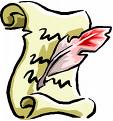



 Liberty
and Independence
Liberty
and Independence
Liberty and Independence,
We will guard with loyal care,
And hold fast to freedom's presence,
In our home
state Delaware.
from "Our Delaware," the Delaware State Song by Hynson &
Devine
![]()
![]()
![]()
![]()
![]()
![]()
![]()
![]()
![]()
![]()
![]()
![]()
![]()
![]()
![]()
![]()
![]()
![]()
![]()
![]()
![]()
![]()
![]()
![]()
Delaware 1897, Preamble:
Through Divine Goodness all men have, by nature, the rights of worshiping and serving their Creator according to the dictates of their consciences.
DELAWARE BILL OF RIGHTS ARTICLE I
(Article I of the 1897 Constitution of Delaware as amended to 1974)
FREEDOM OF RELIGION
Sec. 1. Although it is the duty of all men frequently to assemble together for the public worship of Almighty God; and piety and morality, on which the prosperity of communities depends are hereby promoted;
yet no man shall or ought to be compelled to attend any religious worship, to contribute to the
erection or support of any place of worship, or to the maintenance of any ministry, against his own free will and consent; and no power shall or ought to be vested in or assumed by any magistrate that shall in any case interfere with, or in any manner control the rights of conscience, in the free exercise or religious worship, nor a preference given by law to any religious societies, denominations, or modes of worship.
Proclaim liberty throughout all the land unto all the inhabitants thereof.
Leviticus 25:10
![]()
![]()
![]()
![]()
![]()
![]()
![]()
![]()
![]()
![]()
![]()
![]()
![]()
![]()
![]()
![]()
![]()
![]()
![]()
![]()
![]()
![]()
![]()
![]()
![]()
![]()

What students would learn in American schools above all is the religion of Jesus Christ.
George Washington
in speech to the Delaware Indian Chiefs,1779
David Zeisberger (1721-1802) was a Moravian missionary who spent much of his life working with the Delaware Indians. His Spelling Book contains a Short History of the Bible in the English and Delaware languages. While a youth, he lived in Holland, London, and later joined a Moravian colony in Georgia. Zeisberger moved to Pennsylvania about 1740 with the colony where he helped ally the Iroquois with the English against French aggressions on the continent.
There were many converts amongst the natives, but Zeisberger's mission was destroyed (1777) during the American Revolution. Fearful for their lives and often facing opposition from non-Christian Delawares, the Christian Indians had abandoned the mission, In 1781, the British arrested Zeisberger and his assistant for treason. The two men convinced British authorities of their neutrality and were released.
Zeisberger later set up other missions in Ohio and one in Canada. http://www.loc.gov/exhibits/religion/obj-list.html See E. A. De Schweinitz, The Life and Times of David Zeisberger (1870, repr. 1971).
Delaware Indian and English Spelling Book for the Schools of the Mission of the United Brethren David Zeisberger Philadelphia: Mary Cist, 1806 Rare Book and Special Collections Division, Library of Congress
From early governing documents:
|
"BECAUSE no People can be truly happy, though under the
greatest Enjoyment of Civil Liberties, if abridged of the Freedom of their
Consciences, as to their Religious Profession and Worship: And Almighty God
being the only Lord of Conscience, Father of Lights and Spirits; and the
Author as well as Object of all divine Knowledge, Faith and Worship, who
only doth enlighten the Minds, and persuade and convince the Understandings
of People, I do hereby grant and declare, That no Person or Persons,
inhabiting in this Province or Territories, who shall confess and
acknowledge Our almighty God, the Creator, Upholder and Ruler of the world;
and professes him or themselves obliged to live quietly under the Civil
Government, shall be in any Case molested or prejudiced, in his or their
Person or Estate, because of his or their conscientious Persuasion or
Practice, nor be compelled to frequent or maintain any religious Worship,
Place or Ministry, contrary to his or their Mind, or to do or suffer any
other Act or Thing, contrary to their religious Persuasion. AND that all Persons who also profess to believe in Jesus Christ, the Saviour of the World, shall be capable (notwithstanding their other Persuasions and Practices in Point of Conscience and Religion) to serve this Government in any Capacity, both legislatively and executively..." Charter of Delaware, 1701 "That all Men
have a natural and unalienable Right to worship Almighty God according to
the dictates Of their own conscience and understandings; that no Man ought
or of right can he compelled to attend any religious Worship or maintain any
Ministry contrary to or against his own free Will and Consent, and that no
Authority can or Ought to be vested in, or assumed by any Power whatever
that shall in any Case interfere with, or in any Manner control the Right of
Conscience in the Free exercise of Religious Worship.
Article 29. There shall be no establishment of any religious sect in this State in preference to another; and no clergyman or preacher of the gospel, of any denomination, shall be capable of holding any civil office in this state, or of being a member of either of the branches of the legislature, while they continue in the exercise of the pastoral function." Delaware State Constitution, 1776 |
The early settlers developed colonial charters that were decidedly evangelical in their purpose, often expressing a goal for their colony to advance the Christian religion. As the country progressed up to the revolutionary war period, state constitutions evolved from the charters. Those state constitutions served to maintain the order already established by the original charters, the charters based on Christianity.
http://www.dailyclipart.net/wp-content/uploads/medium/clipart0277.jpg